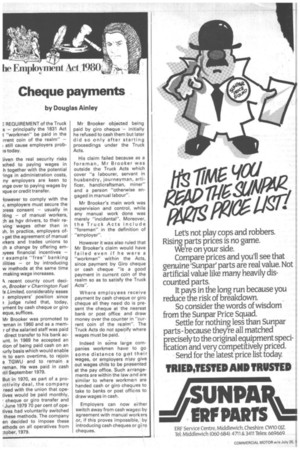Cheque payments
Page 38

If you've noticed an error in this article please click here to report it so we can fix it.
by Douglas Ainley
E REQUIREMENT of the Truck s — principally the 1831 Act t "workmen" be paid in the rrent coin of the realm" — I still cause employers probis today.
liven the real security risks ached to paying wages in h together with the potential ings in administration costs, ny employers are keen to Inge over to paying wages by aque or credit transfer.
lowever to comply with the
employers must secure the a ress consent — usually in iting — of manual workers, ;h as hgv drivers, to their reving wages other than in ;h. In practice, employers ofa get the agreement of manual irkers and trades unions to
a change by offering emwees financial incentives — r example "free" banking ilities — or by introducing w methods at the same time making wage increases.
5, recent county court deciin, Brooker v Charrington Fuel Is Limited, considerably eases .1, employers' position since
judge ruled that, today, yment by cash cheque or giro eque, suffices.
Vir Brooker was promoted to -eman in 1960 and as a memr of the salaried staff was paid direct transfer to his bank acunt. In 1969 he accepted an ition of being paid cash on an iurly basis which would enable 11 to earn overtime, to rejoin e TGWU and to remain a reman. He was paid in cash itil September 1979.
But in 1970, as part of a proactivity deal, the company reed with the union that opelives would be paid monthly, cheque or giro transfer and 'June 1979 70 per cent of opetives had voluntarily switched these methods. The company en decided to impose these ethods on all operatives from ;tober, 1979. Mr Brooker objected being paid by giro cheque "— initially he refused to cash them but later did so only after starting proceedings under the Truck Acts.
His claim failed because as a foreman, Mr Brooker was outside the Truck Acts which cover "a labourer, servant in husbandry, journeyman, artificer, handicraftsman, miner" and a person "otherwise engaged in manual labour".
Mr Brooker's main work was supervision and control, while any manual work done was merely "incidental". Moreover, the Truck Acts include "foreman" in the definition of "employer".
However it was also ruled that Mr Brooker's claim would have failed even if he were a "workman" within the Acts, since payment by Giro cheque or cash cheque "is a good payment in current coin of the realm so as to satisfy the Truck Acts".
Where employees receive payment by cash cheque or giro cheque all they need do is present the cheque at the nearest bank or post office and draw money over the counter in "current coin of the realm". The Truck Acts do not specify where wages must be paid.
Indeed in some large companies workmen have to go some distance to get their wages, or employers May give out wages chits to be presented at the pay office. Such arrangements are within the law and are similar to where workmen are handed cash or giro cheques to take to banks or post offices to draw wages in cash.
Employers can now either switch away from cash wage:3 by agreement with manual workers or, if this proves impossible, by introducing cash cheques or giro cheques.








































